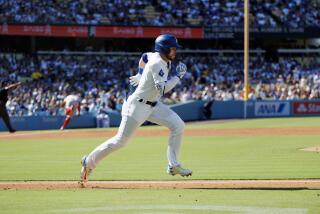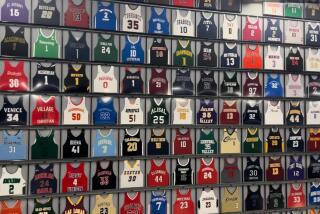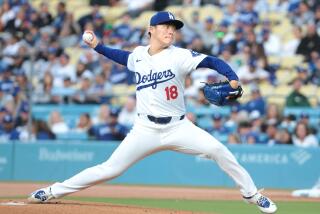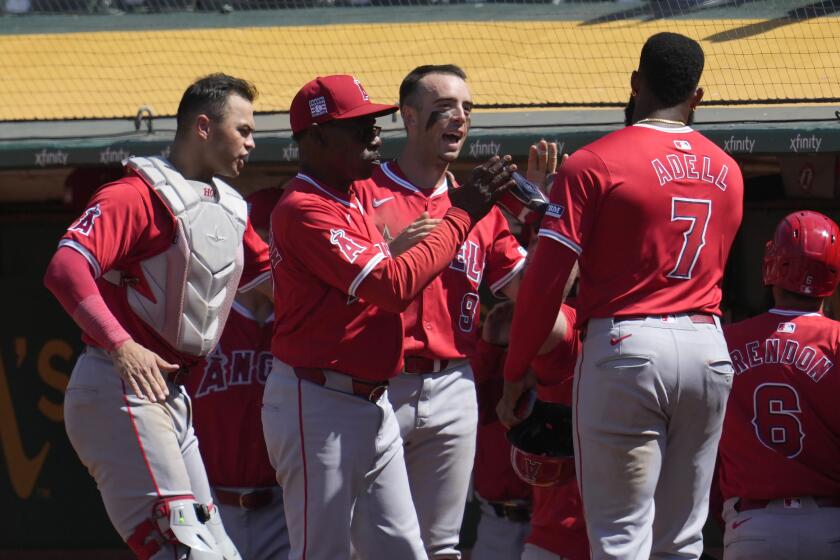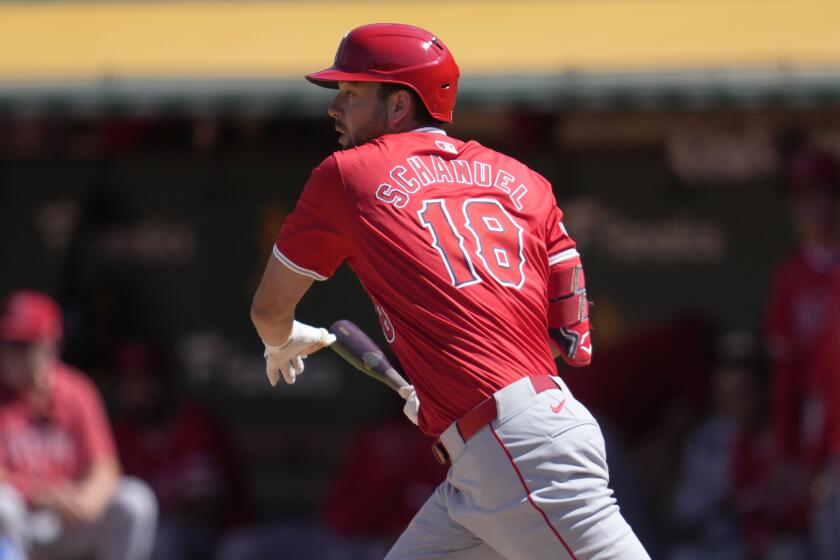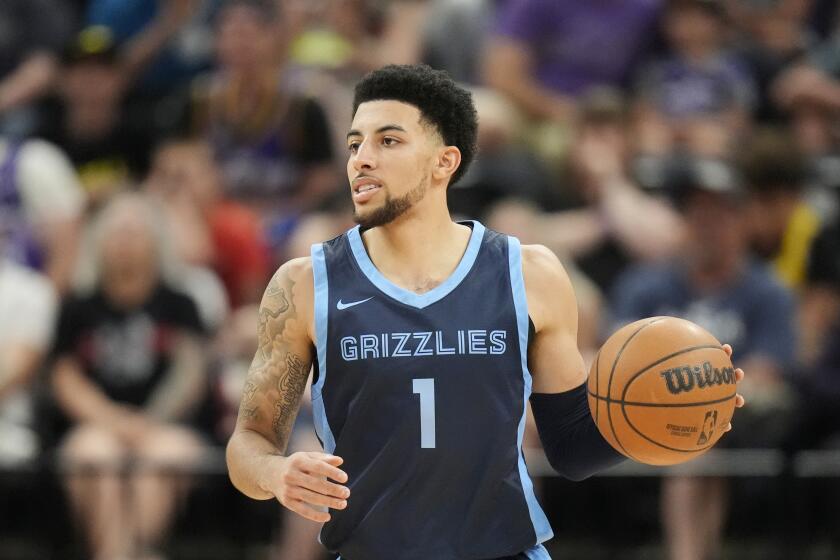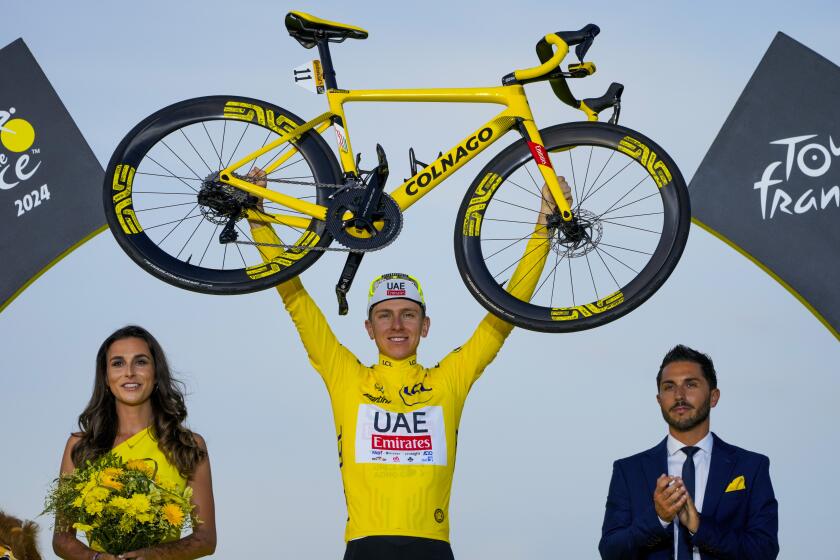Court of Unappeal : U.S. Davis Cup Hopes Might Be Mired in a Doctored Surface
Should Tom Gullikson declare himself a latter-day homesteader and camp out on a plot of crimson earth in central Moscow to protect his rights?
“Might not be a bad idea,” he says, only half kidding. Gullikson’s mission to Moscow, as U.S. Davis Cup captain, is to win the 95-year-old sterling tub that is emblematic of the world team championship in tennis, the climax of a tournament that involved 115 entries. Only the guys from nine countries--Americans 30 times--have guzzled victors’ champagne from the basin donated by a rich Harvard kid, Dwight Davis, in 1900.
Gullikson wonders if it’s the Cold War revisited as he prepares his troops--Pete Sampras, Andre Agassi, Jim Courier, Todd Martin and Richey Reneberg--for this weekend’s clash against Russia in the cavernous Olympic Stadium, where the specially constructed clay court could become a quicksand patch for the Yanks.
Gullikson, perhaps unwisely, didn’t bring a sleeping bag so that he could monitor the battleground round the clock, but is well aware that the court was doctored favorably for the natives before Russia’s staggering 3-2 upset of favored Germany in a September semifinal.
“I’m on my guard to prevent a repeat,” the captain says. “And so are the [neutral] officials from the ITF [the governing International Tennis Federation].”
That latest version of court intrigue was, indeed, a sticky wicket for the fast-court loving Germans, Boris Becker and Michael Stich. Customarily, the town’s annual pro tournament on the ATP Tour, the Kremlin Cup, is contested on a quick plastic rug. It remained in place for the 1994 Davis Cup final, in which Sweden beat the Russians, 4-1.
Not so good for the favorite team of presidential first hacker, Boris Yeltsin. The answer was to put the brakes on speed freaks Becker and Stich, throw dirt on their parade in the form of a turgid clay court. Thus it was laid for the occasion inside the massive, deteriorating arena that seats 40,000--cordoned off to 17,000 for tennis. It worked.
Not satisfied that the court was pokey enough, Russian management--was the KGB involved?--decided that miring the Germans was even better. How about a cloudburst? Difficult to arrange indoors, thus they hosed down the court so heavily that it was unplayable at game time. German captain Nikki Pilic complained long and loud, and eventually the ITF censured the Russian Federation and fined it $25,000 for the dirty trick.
Even so, Becker and Stich won their opening matches for a 2-0 lead. But Becker, straining his back on the slippery soil, was knocked out of the climactic third day in the best-of-five match series. His sub, Bernd Karbacher, was beaten by Russian ace Yevgeny Kafelnikov. Then crafty dirt kicker Andrei Chesnokov saved nine match points and interred Stich, and Germany, in the red dust that had cost $50,000 to spread on the concrete floor.
And now, there is more court intrigue upon us. Another 50-grand initiative just for the Americans, none of whom has played in Russia, and one of whom--world No. 1 Sampras--has performed on clay this season like Laurel and Hardy in banana peel land. The court dedicated to repelling the Germans--though not as violently as they were from Moscow’s outskirts in 1941--was dug up and replaced by U.S.-manufactured plastic for the Kremlin Cup stopover, Nov. 6-12. Thereafter earth was moved, and the red monster is back again, down and dirty, a strictly European setting for the unprecedented meeting of Russia and the United States.
Tailoring a playground to give the home side an edge is hardly novel. Ask any baseball groundskeeper.
The French were famous during the 1920s for enhancing the five-year hold on the Cup by the Four Musketeers Borotra, Brugnon, Cochet, Lacosta by sprinkling Roland Garros Stadium generously and swamping the United States.
Sweden startlingly installed a clay court within Goteborg’s Scandinavium for the 1984 final and trapped Jimmy Connors and John McEnroe, 4-1. Team captain Arthur Ashe led a supposedly dreamy lineup: Nos. 1-2 Connors and McEnroe in singles, No. 1 McEnroe-Peter Fleming in doubles. It looked the most formidable in Cup history. On paper. Unluckily, the invaders found not paper underfoot but clay, which their feet soon resembled as Mats Wilander and unheralded Henky Sundstrom took them apart.
A profitable lesson. Six years later, at the final inside the St. Petersburg Sundome in Florida, the United States, using baseliners Agassi and Michael Chang, called in the bulldozers and played the dirt card, beating an indignant Australia, 4-1. The unexpected switch to clay took the best Aussie, attack-minded volleyer Patrick Cash, right out of the singles lineup.
But, alas, where is Chang, the firmest American Cup competitor of recent times, when he’s desperately needed? His need is felt even more sorely with Agassi doubtful, not recovered fully from a chest muscle pull suffered during his victory over Wilander as the U.S. team beat Sweden, 4-1, in the other semifinal.
“We invited Chang to play in each of our first two matches [against France and Italy], but he declined,” says Gullikson. “That’s his business. But I believe in sticking with the guys who got us here.”
Chang, fresh from beating Sampras in Frankfurt--and on a lightning-fast court--really felt unwelcome, left out when U.S. Tennis Assn. President Les Snyder made an early season deal with Agassi and Sampras to play the last three matches, including staging the semifinals in Las Vegas, Agassi’s hometown.
In a sport of individualists thrown together in the unnatural, ultra-nationalistic Cup atmosphere of team play, computer rankings have seldom meant anything, as the Germany-Russia engagement was the most recent to confirm. Hero Chesnokov, considered a has-been, was ranked 59th to Stich’s No. 12. Sampras may be No. 1 but he was just another guy named Pete in first-round losses in the big clay tests, the Italian and French Opens. Sampras has been only so-so in the emotional caldron of Davis Cup competition.
“I can play a lot better than that, and have--and will,” says Sampras, who won the Italian in 1994, and was a French quarterfinalist in 1991, ’92 and ’93. “I was having confidence problems last spring, but I’m OK now.”
He’ll have to be if the tourists, the only U.S. tennis expeditionary force to invade Russia, expect to bring home a metallic prize other than tins of caviar. Kafelnikov, No. 6, a slick shotmaker who beat Agassi at the French, and Chesnokov, No. 90, are very much at home on home loam.
Originally, Gullikson planned to use Courier, a proven clay maven, and Agassi in singles. He hopes, but doubts, that Agassi will be ready.
“Andre’s the intriguing factor,” the captain says. “He wants to play--has volunteered for doubles if he feels able to play just one match. And his return of serve could be a factor despite his lack of doubles experience.”
Doubles has been a U.S. crapshoot for three years--Americans are 4-4--whereas Andrei Olhovskiy and Kafelnikov are a solidly coordinated unit who started Russia’s comeback by beating Becker and Stich.
“I don’t know who I’ll play,” says Gullikson in pondering the pivotal middle match. But he isn’t required to name a pairing until an hour before post time.
Courier and Sampras, who won the Italian title as kids in 1989, and played well together in the Barcelona Olympics, would seem logical, although that may mean three matches in three days for each. Could be Todd Martin and spare Richey Reneberg.
Snow is on the ground, but Moscow is heated up not only over the presidential election but the prospect of beating the U.S.A. in something, even if it’s only tennis.
Tennis isn’t exactly engraved on the Russian heart, the way hockey or soccer are, but Tolstoy was one of the first Russians to play. The last czar, Alexander II, was a hacker, and so is Yeltsin, who would love to chug-a-lug vodka from a Davis Cup never before won by his country. Maybe he’ll call out the fire department to drench the court with a more useful liquid.
More to Read
Go beyond the scoreboard
Get the latest on L.A.'s teams in the daily Sports Report newsletter.
You may occasionally receive promotional content from the Los Angeles Times.
